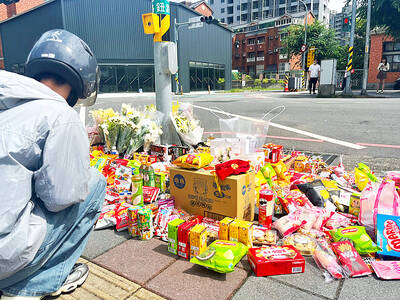German producer prices, the cost of goods at the factory gate, plunged by 4.6 percent last month from the same month a year earlier, the sharpest decline since December 1968, the national statistics office said yesterday.
In May, producer prices in the biggest European economy had fallen by 3.6 percent, the Destatis office said.
On a monthly basis, they decreased by 0.1 percent last month, after having remained unchanged one month earlier.
Analysts polled by Dow Jones Newswires had expected prices to shed 4.3 percent on the year and gain 0.4 percent from May.
The figures were in part driven by a decline in energy prices which spiked higher a year ago, and when they were stripped out of the calculation, producer prices fell by a more modest 2.8 percent on the year, Destatis said.
The cost of energy was 8.4 percent lower last month than in the same month a year earlier, and 0.3 percent lower than in May.
Mineral oil products cost 24.9 percent less on a 12-month basis, while electricity prices decreased by 5.7 percent and natural gas was 3.5 percent cheaper.
The data fuels concern over deflation within the 16-nation eurozone, where consumer prices fell for the first time on record last month.
Most economists expected inflation to dip briefly into negative territory but have ruled out a longer Japanese-like bout of deflation, a pernicious downward spiral in prices.
While the prospect of falling prices may delight consumers, deflation, or a run of falling prices, can wreak havoc on the broader economy as households and businesses curb purchases in hope of getting a better bargain in the future.
This can cause a downwards spiral of prices, production, unemployment and further deflation.
Germany is in the midst of its worst recession since 1945, with the steepest decline in output probably occurring in the first three months of this year, when activity contracted by 3.8 percent from the previous quarter.
Meanwhile, Germany may force banks to take state aid to ward off a credit crunch later this year, the Suddeutsche Zeitung newspaper said yesterday.
In exchange, the state may take stakes in the banks, it added.
Until now, German Chancellor Angela Merkel and Finance Minister Peer Steinbrueck have refused to force state aid on banks as was done in the US and Britain.
But credit conditions for businesses and households have continued to deteriorate and tougher measures might be needed to ensure companies can obtain the loans they need to help Germany pull out of its recession, the report said.
The biggest European economy is expected to contract by six percent this year, marking its deepest recession since World War II.
To date, the government has recapitalized just two banks, property lending specialist Hypo Real Estate and the second biggest German bank, Commerzbank.
German banks are heavily exposed to losses stemming from the international financial crisis and the collapse of the US market for high-risk, or subprime, mortgages.

Nvidia Corp yesterday unveiled its new high-speed interconnect technology, NVLink Fusion, with Taiwanese application-specific IC (ASIC) designers Alchip Technologies Ltd (世芯) and MediaTek Inc (聯發科) among the first to adopt the technology to help build semi-custom artificial intelligence (AI) infrastructure for hyperscalers. Nvidia has opened its technology to outside users, as hyperscalers and cloud service providers are building their own cost-effective AI chips, or accelerators, used in AI servers by leveraging ASIC firms’ designing capabilities to reduce their dependence on Nvidia. Previously, NVLink technology was only available for Nvidia’s own AI platform. “NVLink Fusion opens Nvidia’s AI platform and rich ecosystem for

WARNING: From Jan. 1 last year to the end of last month, 89 Taiwanese have gone missing or been detained in China, the MAC said, urging people to carefully consider travel to China Lax enforcement had made virtually moot regulations banning civil servants from making unauthorized visits to China, the Control Yuan said yesterday. Several agencies allowed personnel to travel to China after they submitted explanations for the trip written using artificial intelligence or provided no reason at all, the Control Yuan said in a statement, following an investigation headed by Control Yuan member Lin Wen-cheng (林文程). The probe identified 318 civil servants who traveled to China without permission in the past 10 years, but the true number could be close to 1,000, the Control Yuan said. The public employees investigated were not engaged in national

ALL TOGETHER: Only by including Taiwan can the WHA fully exemplify its commitment to ‘One World for Health,’ the representative offices of eight nations in Taiwan said The representative offices in Taiwan of eight nations yesterday issued a joint statement reiterating their support for Taiwan’s meaningful engagement with the WHO and for Taipei’s participation as an observer at the World Health Assembly (WHA). The joint statement came as Taiwan has not received an invitation to this year’s WHA, which started yesterday and runs until Tuesday next week. This year’s meeting of the decisionmaking body of the WHO in Geneva, Switzerland, would be the ninth consecutive year Taiwan has been excluded. The eight offices, which reaffirmed their support for Taiwan, are the British Office Taipei, the Australian Office Taipei, the

DANGEROUS DRIVERS: The proposal follows a fatal incident on Monday involving a 78-year-old driver, which killed three people and injured 12 The Ministry of Transportation and Communications yesterday said it would lower the age for elderly drivers to renew their license from 75 to 70 as part of efforts to address safety issues caused by senior motorists. The new policy was proposed in light of a deadly incident on Monday in New Taipei City’s Sansia District (三峽), in which a 78-year-old motorist surnamed Yu (余) sped through a school zone, killing three people and injuring 12. Last night, another driver sped down a street in Tainan’s Yuching District (玉井), killing one pedestrian and injuring two. The incidents have sparked public discussion over whether seniors